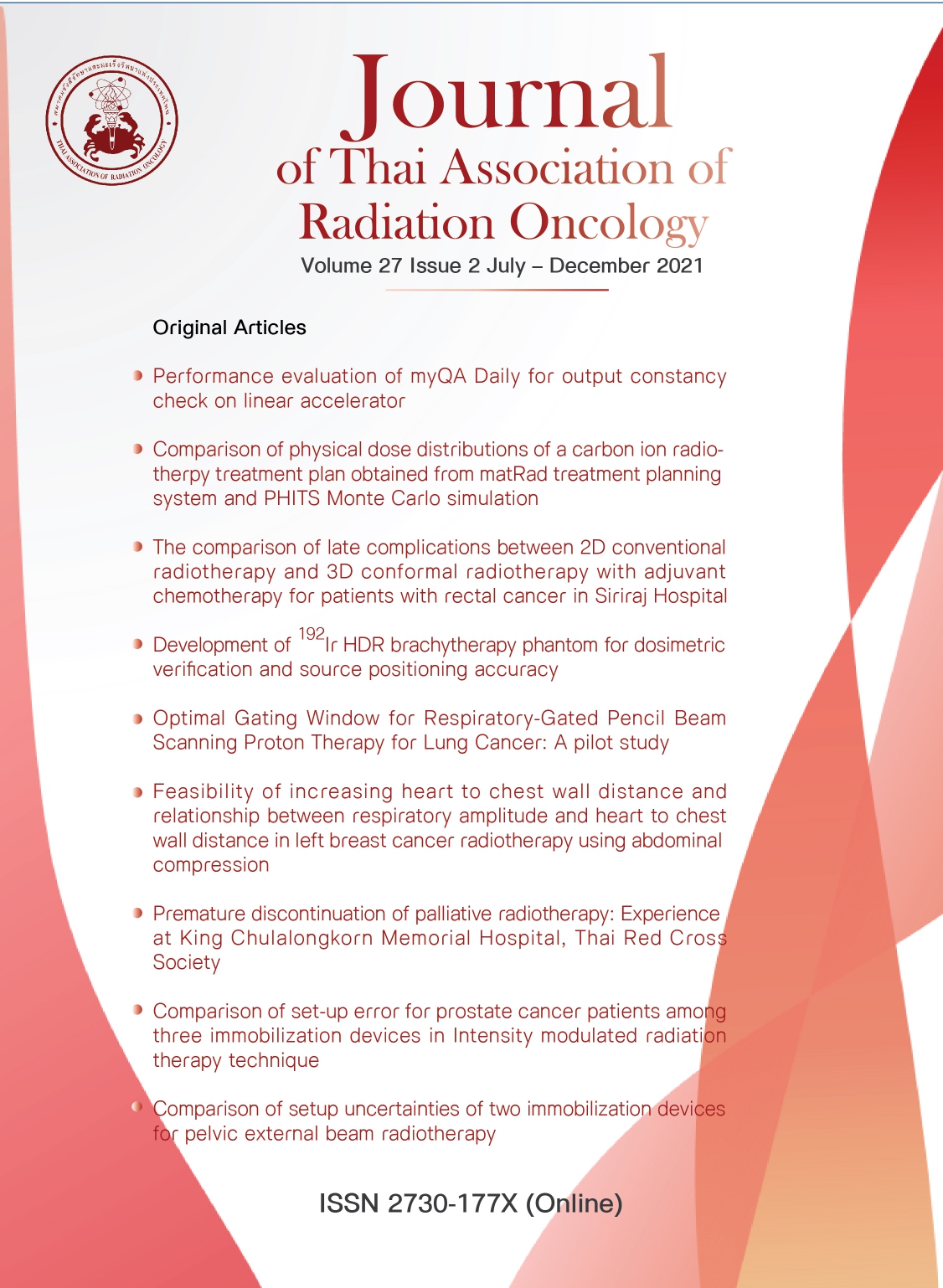The comparison of late complications between 2D conventional radiotherapy and 3D conformal radiotherapy with adjuvant chemotherapy for patients with rectal cancer in Siriraj Hospital
Keywords:
rectal cancer, 2D radiotherapy, 3D conformal radiotherapy, late complicationAbstract
Background: The transition of adjuvant radiotherapy techniques in treating locally advanced rectal cancer had been developed from 2-dimension conventional radiotherapy (2D-RT) to 3-dimensional conformal radiotherapy (3D-CRT). Theoretically, the 3D-CRT technique showed the advantage of more target dose coverage in treating field and lessen normal tissue toxicity compared to 2D-RT technique.
Objectives: To compare late radiation complications and quality of life (QoL) between patients receiving 2D-RT and 3D-CRT.
Materials and Methods: Locally advanced rectal cancer patients (T2-4 and/or lymph node positive), who received adjuvant either pre- or post-operative concurrent chemoradiotherapy between January 2012 and December 2018, were divided into 2 treatment groups: 2D-RT or 3D-CRT. After long term follow-up, we evaluated the late radiation complications using the RTOG/EORTC Late Radiation Morbidity Scoring Schema, and the QoL using the FACT-C Questionnaires, version 4.
Results: 235 locally advanced rectal cancer patients, (2D-RT; n = 62 and 3D-CRT; n = 173), were enrolled in this study. The median follow-up time was 4.92 years in 2D-RT group vs. 2.18 years in 3D-CRT group. There was no significant difference in late small / large intestine and bladder complications between 2 treatment groups. However, the QoL measurement showed better scores in longer follow-up time.
Conclusion: The longer follow-up periods had a significant impact on greater daily living. While there was no difference in late small / large intestine and bladder complications between both radiation techniques.
References
National Cancer Institute. Cancer Stat Facts: Common Cancer Sites. Estimated New Cancer Cases and Deaths for 2018. https://seer.cancer.gov/statfacts/html/common.html
National Cancer Institute, Ministry of Public Health, Thailand. Hospital-Based Cancer Registry 2017. 2018;1: xvii-iii.
Siriraj Cancer Canter. Siriraj Cancer Registry 2017. 2018;1:55-7.
Thomas PR, Lindblad AS. Adjuvant postoperative radiotherapy and chemotherapy in rectal carcinoma: a review of the Gastrointestinal Tumor Study Group experience. Elsevier 1988;13:245-52.
Krook JE, Moertel CG, Gunderson LL, Wieand HS, Collins RT, Beart RW, et al. Effective surgical adjuvant therapy for high-risk rectal carcinoma. N Engl J Med 1991;324:709-15.
Leonard LG, Joel ET, Jeffrey AB. Clinical radiation oncology. 4th ed. China: Churchill Livingstone; 2007.
O’Connell MJ, Martenson JA, Wieand HS, Krook JE, Macdonale JS, Haller DG, et al. Improving adjuvant therapy for rectal cancer by combining protracted-infusion fluorouracil with radiation therapy after curative surgery. N Eng J Med 1994;331:502-7.
Corner R, Khimji F, Tsang Y, Harrison M, Glynne-Jones R, Hughes R. Comparison of conventional and three-dimensional conformal CT planning techniques for preoperative chemoradiotherapy for locally advanced rectal cancer. BJR 2011;84:173-8.
Cella L, Ciscognetti N, Martin G, Liuzzi R, Punzo G, Solla R, et al. Preoperative radiation for rectal cancer: Comparison of target coverage and small intestine NTCP in conventional vs. 3D-conformal planning. Medical Dosimetry 2009;34:75-81.
Komori K, Kimura K, Kinoshita T, Sano T, Ito S, Abe T, et al. Complications associated with postoperative adjuvant radiation therapy for advanced rectal cancer. Int Surg 2014;99:100-5.
Guckenberger M, Flentje M. Late small bowel toxicity after adjuvant treatment for rectal cancer. Int J Colorectal Dis 2006;21:209-20.
Sauer R, Liersch T, Merkel S, Fietkau R, Hohenberger M, Hess C, et al. Preoperative versus postoperative chemoradiotherapy for locally advanced rectal cancer: Results of the German CAO/ARO/AIO-94 randomized phase III trial after a median follow-up of 11 years. J Clin Oncol 2012;30:1926-33.
Marventano S, Forjaz MJ, Grosso G, Mistretta A, Giorgianni G, Platania A, et al. Health related quality of life in colorectal cancer patients: State of the art. BMC Surg 2013;13(Suppl 2);S15.
Yoo HJ, Kim JC, Eremenco S, Han OS. Quality of life in colorectal cancer patients with colectomy and the validation of the functional assessment of cancer therapy-colorectal (FACT-C), version 4. J Pain Symptom Manage 2005;30:24-32.
Downloads
Published
How to Cite
Issue
Section
License
บทความที่ได้รับการตีพิมพ์เป็นลิขสิทธิ์ของวารสารมะเร็งวิวัฒน์ ข้อความที่ปรากฏในบทความแต่ละเรื่องในวารสารวิชาการเล่มนี้เป็นความคิดเห็นส่วนตัวของผู้เขียนแต่ละท่านไม่เกี่ยวข้องกับ และบุคคลากรท่านอื่น ๆ ใน สมาคมฯ แต่อย่างใด ความรับผิดชอบองค์ประกอบทั้งหมดของบทความแต่ละเรื่องเป็นของผู้เขียนแต่ละท่าน หากมีความผิดพลาดใดๆ ผู้เขียนแต่ละท่านจะรับผิดชอบบทความของตนเองแต่ผู้เดียว




